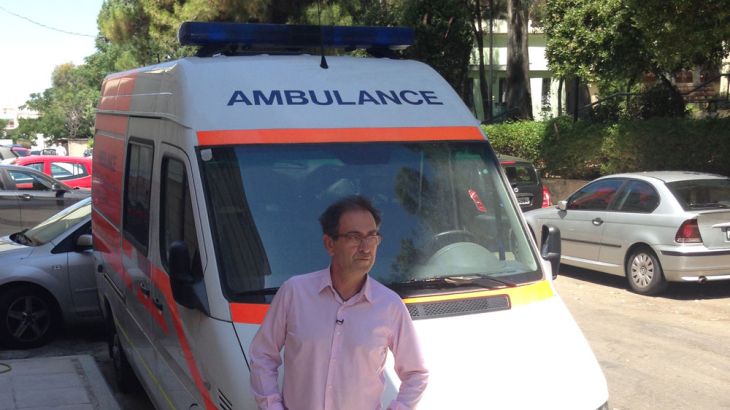Greece’s hospital of hope
Elpis Hospital in Athens strives against all odds to treat as many patients as possible amid grave healthcare crisis.

Today at Athens’ Elpis Hospital, as Dr Theo Giannaros makes his rounds, he is relieved to find all the patients in stable condition.
Greece’s crumbling healthcare system may be on life support, but he won’t let his facility fall ill.
Keep reading
list of 4 itemsDeadly Sahel heatwave caused by ‘human-induced’ climate change: Study
Woman, seeking loan, wheels corpse into Brazilian bank
UK set to ban tobacco sales for a ‘smoke-free’ generation. Will it work?
“Nobody is going to tell us who is going to live and who is going to die,” Giannaros, a former military commando and director of the hospital, tells me adamantly.
“We are going to treat everybody, regardless of their colour, of their religion, or their financial status.”
No matter what consequences he may face, Giannaros is committed to doing whatever he can to help as many people as possible.
|
|
After all, in Greek, the word Elpis means hope. And that’s exactly what the mission of Elpis Hospital is: to bring hope to the uninsured, to the unemployed, to people in need.
“In Greece we have about one and a half million unemployed people,” explains Giannaros.
“That means about three and a half million uninsured. They need medical help.”
He tells me the problem faced by hospitals in Greece is far worse than most realise: that medical budgets have been slashed and medication is hard to obtain; that bureaucracy has become so thick, even the nimble hands of a surgeon would have trouble slicing through it.
“We used to say in this hospital that we are not following medical protocols,” explains Giannaros, exasperated.
“You know why? Because they are not medical protocols. They are financial protocols.”
Budget cuts, he insists, have brought ruin upon the country’s medical infrastructure.
“We’re a medium-sized hospital, 220 beds,” Giannaros tells me.
“In 2009, our budget was about $20m. In 2014, it was about $7m – that is one third of what we got in 2009.”
Sickly economy
The sickly economy, Giannaros assures me, has meant more people are ailing and fewer are being treated than ever before.
“Greeks are known for their smile,” he says.
“Now you see the depressed eyes, the frightened eyes, the sad eyes. That means that our souls have changed. Depression is our friend now.”
Indeed, there has been a shocking spike in suicide rates in Greece. A study by Medscape says that in less than two years, there has been a 35 percent increase in suicides.
|
|
It has become so bad, that even during a time of shortage, Giannaros cannot use some of the much-needed medical equipment he already has.
Outside his office is an ambulance, sitting idle. Dust has gathered on its windshield, leaves have collected under its tyres.
Giannaros tells me the situation is ridiculous, but certainly not funny: that because he secured the vehicle from foreign donors without first obtaining the approval of his superiors, and has not been able to get license plates issued for the mobile medical unit since.
“I dared to bring donations without asking the municipality of Athens,” says a frustrated Giannaros about the ambulance that arrived two years ago.
His patience has run out.
“I’m going to drive it myself,” he declares, “even without numbered plates. We’re going to use it.”
I ask him what he thinks will happen to him when he does.
“I don’t know. Maybe I go to prison,” he replies with a grin. “But I’m going to get free immediately.”
At a time of great austerity, that fighting spirit has inspired his staff and comforted their patients.
Compassion and creativity
While taking me on a tour of the facilities, Giannaros says compassion, creativity and will power are what matter most.
He adds that while many hospitals have closed clinics during the financial crisis, “we created three new clinics after 2012”.
“This is an example how you can operate a hospital with nothing,” he says.
“That means with no money, giving exactly the same quality of service, health services to the people as before.”
Hippocrates, an ancient Greek physician, is considered the father of modern medicine. It is his vow that doctors still swear by.
“May I always act,” the Hippocratic Oath states, “so as to preserve the finest traditions of my calling.”
Those traditions are still very much respected and observed by Dr Giannaros and Elpis Hospital.
Helen Skopis contributed to this report. Fadi Elbenny shot the piece.
![Dr Giannaros cannot use some of the medical equipment he already has, including an ambulance [Mohammed Jamjoom/Al Jazeera]](/wp-content/uploads/2015/07/886bc9752d0a48f09bde17ea0a6b06f0_18.jpeg)